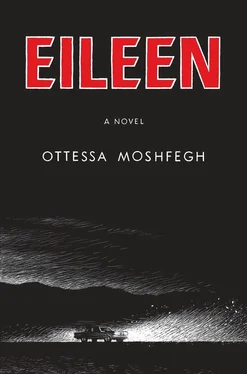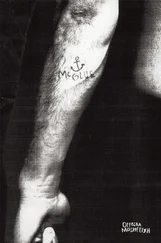“Bradley?” I’d forgotten Dr. Frye’s replacement, Dr. Bradley Morris, with the bald head. Was he scrawny? Was he a real man by Rebecca’s standards? I had no idea. Was she involved with him somehow?
“The new headshrinker,” said Rebecca. “To tell you the truth”—there was that phrase again—“I don’t think his head’s been shrunk down quite enough, if you know what I mean.” It took me a moment to compute. Was this a comment on his proportions? I was like a pubescent boy, fumbling for words. Seeing my blank look, Rebecca said, almost apologetically, “Big headed, I mean. But I’m kidding. He seems like a perfectly nice person.”
I cursed myself for being so slow, so dense. I wanted to explain that I was intelligent, well-read, that I’d been to college, that I knew who Freud was, that I didn’t belong in that prison, that I was exceptional, I was cool, but it seemed petty to defend myself.
“I’ve never been inside that office,” I said instead. “Dr. Frye always kept it locked, and only the boys ever went in there.” I didn’t have a quick wit like she did. I was graceless, pedestrian and dull. Apart from my size, I couldn’t impress Rebecca at all. I should have asked her about herself, her plans at Moorehead, how she got interested in prison work, what her goals were, her dreams and ambitions, but my mind didn’t work that way back then. I had no manners. I didn’t know how to make friends.
“Come visit any time,” she said, nevertheless. “Unless, of course, the door is closed. Which means I’m with one of the boys.”
“Thank you,” I said. I meant to sound professional. “I’ll stop in next time I’m passing by.”
“Eileen,” she said, pointing her finger at my gut. “Right?”
I blushed deeply, and nodded.
“Call me Rebecca,” she said, winking, and ticktocked away.
I could have swooned with embarrassment and exhilaration. She’d remembered my name. That meant a great deal to me. I’d forgotten all about Leonard Polk’s file. Earlier that morning I’d hoped Rebecca would give it back in case Mrs. Stephens found it missing and questioned me about it. But what did I care now? I had a real friend — someone who knew me, wanted my company, someone I felt connected to. I would replay that conversation with Rebecca, and every other one I had with her, again and again for years afterward as I came to terms with what would happen in the days ahead. At that moment, I felt happy. Meeting Rebecca was like learning to dance, discovering jazz. It was like falling in love for the first time. I had always been waiting for my future to erupt around me in an avalanche of glory, and now I felt it was really happening. Rebecca was all it took. Per aspera ad astra .
I had to set aside my reflections on the brief exchange with Rebecca that morning since it was a day for visitors and I had to work. There was already a gaggle of tearful mothers and small children sitting impatiently on the chairs in the waiting room by the time I got back to my desk. I remember one of the mothers had come to see her twelve-year-old son who had burned down the family house. He was a short, full-cheeked, brown-haired boy with duck feet and the beginnings of a mustache on his upper lip. I paid close attention to those strange hairs growing there. His reminded me of my own upper lip. I used to pluck those hairs routinely with tweezers. All the time I wasted plucking my face at the bathroom mirror, I could have written a book. I could have learned to speak French. My eyebrows were always thin and weak, so I never had to pluck them. I’ve heard having weak brows is a sign of indecisiveness. I prefer to think it is the mark of an open heart, an appreciation of possibility. In that fashion magazine with the cat-fur hat, I’d read how some women draw their eyebrows with a pencil to be thick and dark. Ridiculous, I’d thought. Standing outside the visitation room, I tapped the bony points of my hips with the butt of my fist, a habit which assured me, somehow, of my superiority, my great strength.
When the little arsonist was seated across from his mother at the table, he did what all the younger boys did. They crossed their arms and faced the wall, steeled themselves, pouty and squinty, unreachably cool. But once they took one look at their mothers’ pained faces, they burst into tears. The arsonist burst into tears. His mother pulled a handkerchief from her pocket and handed it across the table. Randy bolted into the room, holding one firm open palm in front of the boy, blocking the mother’s extended hand with the other. “Sorry,” he said, monotonously. “That’s not allowed.”
“You can hug him when you leave,” I chimed in, “but you can’t give him anything. It’s for security, to keep the children safe.” I had some practiced speech like that.
Of course, the rule wasn’t there to protect children from handkerchiefs. I knew what I’d said just wasn’t true. But I was young enough, and had been enslaved enough by my public school education and my father and his Catholicism, and was frightened enough of being punished or questioned or singled out, that I obeyed every rule there was at Moorehead. I followed every procedure. I clocked in and out every day on time. I was a shoplifter, a pervert, you might say, and a liar, of course, but nobody knew that. I would enforce the rules all the more, for didn’t that prove that I lived by a high moral code? That I was good? That I couldn’t possibly want to hike up my skirt and move my runny bowels all over the linoleum floor? I understood perfectly that the rule that prohibited parents from giving gifts to their children was to keep the boys in a state of desperation. The warden proselytized at every possible occasion. His logic was quite sound, I believed. Only a desperate soul would feel remorse for his sins, and if the remorse was deep enough, the boy would surrender and hence he’d be pliable, finally willing to be transformed, so the warden said. The last people on Earth I’d put in charge of transforming anyone were that warden and Dr. Frye, or Dr. Morris — though I never knew him — or, sorry to say, Rebecca. She may have been the worst of all. But I speak with hindsight. At first, yes, Rebecca was a dream to me, she was magic, she was powerful and everything I wanted to be. So no handkerchiefs. No toys, no comics or magazines or books. Let the children cry. No one was offering me any tenderness, after all. Why should any of those boys have any more or better than I had? I lowered my gaze down to Randy’s crotch as he walked back out of the visitation room. He just sucked his teeth and sighed.
“I’m fine,” said the little arsonist, wiping his face with the hem of his smock. His mother whimpered. I remember she wore a white scarf, and when the scarf fell away I saw that the skin on her neck was raised and welted in pink and yellow scars from burns. The visitation was over when the clock showed that seven minutes had passed — visits were seven minutes long and I suppose that had some religious significance — at which point I waved to James, who delivered the arsonist back to the rec room or wherever and brought in the next boy. Randy stood around in the doorway while I collected a final signature from the weepy mother on her way out. Her vitriol came through in her penmanship. While the earlier signature was clean, careful, the outgoing signature was violent, jagged, and rushed. It was always like that. Everybody was broken. Everybody suffered. Each of those sad mothers wore some kind of scar — a badge of hurt to attest to the heartbreak that her child, her own flesh and blood, was growing up in prison. I tried my best to ignore all that. I had to if I was going to act normal, maintain my flat composure. When I was very upset, hot and shaking, I had a particular way of controlling myself. I found an empty room and grit my teeth and pinched my nipples while kicking the air like a cancan dancer until I felt foolish and ashamed. That always did the trick.
Читать дальше












